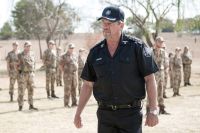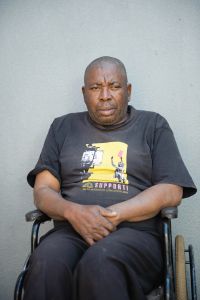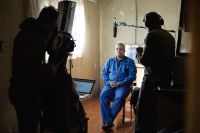The global premiere of 1994: the bloody miracle was screened at the Nelson Mandela Foundation on the evening of 16 April 2014. The locally produced documentary exposes the extraordinary position faced by South Africa in the lead-up to its first democratic elections, and reveals violent struggles – both right-wing plots and internal power struggles within the ANC – that toiled below the surface of the country’s political landscape in an attempt to bring South Africa to its knees.
The breakthrough film promises to change the way the world remembers South Africa’s “Mandela miracle”: our journey as a nation from the shadows and into the light.
From the desk of the directors (and the producer)
The film’s co-director, Meg Rickards, co-director and cinematographer, Bert Haitsma, and producer, Paul Egan, wanted to make a film that would confront viewers with the levels of anger and fear that existed in the lead-up to South Africa’s first democratic elections.
According to them, 20 years on seemed like a good time for looking back, for taking stock.
“During the course of our research, we found the O'Malley archives to be a treasure trove of information. Because of our level of access to people who don't often grant interviews – Jacob Zuma, FW de Klerk, Mangosuthu Buthelezi, Lindiwe Hani, Nico Prinsloo, Eugene de Kock – and the historical significance of the material – we lobbied our commissioning editors at Sabido Productions to donate the materials from the documentary to the Nelson Mandela Foundation archives. We shot much more interview material than appears in the film, and are delighted that it is not going to languish on a hard drive in a cupboard, but instead that Verne Harris, one of the country's leading archivists, will be taking care of it and making it available to others,” said Haitsma.

The team maintains that they learned a lot of things along the way that really shattered their preconceptions.
“We had a notion of the ‘Third Force’s’ involvement in stirring up violence, but had no idea of the extent of the meddling by the state's security apparatus. We hadn’t realised that South Africa’s Military Intelligence offered support not only to Inkatha, but also to ANC members, in an effort to stoke conflict and destabilise the country,” said Rickards.
One of the most enlightening interviews, according to Egan, was with Tienie Groenewald, a former general of Military Intelligence who, in the lead-up to the elections, became one of the leaders of the Volksfront, which aimed for the establishment of an independent Volkstaat or Afrikaner homeland.
“He told us about a complex scheme to kidnap the top leadership of the ANC and National Party in early 1994, to imprison them in Angola in quarters provided by Jonas Savimbi, to force them to listen to demands for a Volkstaat. It sounds harebrained, but the mechanisms were in place. They also planned to throw the country into ‘controlled chaos’ by cutting electricity and water, and by blockading roads. They had members at all the key points,” he said.
Another fascinating interview, for Rickards, was with Daluxolo Luthuli, the grandson of Albert Luthuli. Originally an Umkhonto weSizwe member who fought in then-Rhodesia, Luthuli ended up on Robben Island, was asked to infiltrate Inkatha, and later became part of the IFP leadership in KwaZulu-Natal.

“He was running a hit squad that took out ANC leaders, with a lot of support from Military Intelligence. He gradually realised that he was being manipulated, and that Military Intelligence was in fact supporting both sides. He decided to return to the ANC, bringing many of his henchmen with him, and was received by Nelson Mandela like a prodigal son. When we interviewed Eugene de Kock, it turned out that he and Daluxolo Luthuli knew each other well, and had collaborated in the dissemination of arms,” she said.
Initially the team planned to interview only the “resistors”, those who wanted to stop the elections by any means necessary.
Those who tried to derail the transition do indeed play a major role in the story, but the crew ended up also interviewing victims of the ensuing violence – many of whom lost loved ones or are in wheelchairs.
“What we decided right up front was that we wouldn't interview any experts – no academics, historians, journalists or political analysts. We stuck to our guns on that one, however tempting it was to find an expert voice to make sense of everything. We think what makes 1994 special is that the story is for the most part told from the perspective of the characters. We were constantly taken aback by the openness and eagerness with which so many people told us of their experience. Many of their stories have been denied for too long,” said Haitsma.
The film will be broadcast on e.tv on 27 April 2014, Freedom Day and the 20-year anniversary of South Africa’s first free and fair elections.
The film has been bought by VPRO, the national broadcaster of the Netherlands, and will be the centrepiece of the broadcaster's retrospective on South African democracy.

Notes to Editors
Click to download the film synopsis and key credits
Biographies
Co-director: Meg Rickards
Meg Rickards is a writer-director. Her miniseries and feature versions of Land of Thirst have been broadcast locally and distributed in North America, France and throughout Africa. Meg has written scripts for UNICEF, and her short film Azure won awards and has been used by the World Population Organisation. She holds a PhD in Film Studies from the University of Cape Town, studied at London Film School on a Commonwealth Scholarship, and completed the Writers’ and Directors’ programmes at the Binger Lab in Amsterdam.
Co-director and cinematographer: Bert Haitsma
Bert is a Dutch director of photography currently based in Botswana. He has been working as a DOP for over 20 years – filming documentaries (Sweety), fiction films (Nadine, Victor Nobel), drama series (The Throne, Het Vrije Schaep) and commercials in Europe, South America and Africa. Projects he has filmed have been nominated for the BANFF World Television Award, Golden Statue for Best Television doc and NPS Short Film Award. Bert is a member of the Netherlands Society of Cinematography. In Botswana he has partnered with ABI Films, specialising in commercials.
Producer: Paul Egan
Paul is a Cape Town-based producer. His acclaimed documentary Forerunners (dir. Simon Wood), an in-depth examination of South Africa's new black middle class, was awarded the jury prize at the 2011 Cannes Pan African Film Festival and the Cinematography prize at the United Nations Film Festival. It was also broadcast on the Witness strand at the Al Jazeera English channel. He has collaborated with Meg Rickards on a number of film projects and has produced a number of educational films which are now used extensively across Southern Africa. He holds an MBA from the University of Stellenbosch.
For more information, or for high-resolution behind-the-scene shots or still frames from the film, please contact Meg Rickards: meg@boondogle.co.za